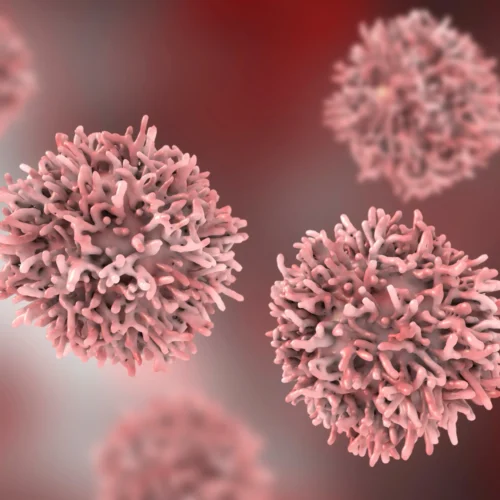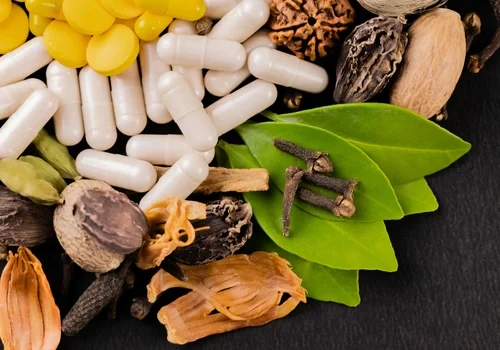Best Ayurvedic Cancer Treatment in India
Cancer is a tough journey. Across India and beyond, many people are suffering from cancer. When your mainstream therapy feels overwhelming, seeking Ayurveda can be gentle, grounded and deeply personal.
Cancer is an abnormal growth of cells. There are more than 100 types of cancer that are affecting people.
Ayurveda, an ancient natural healing system, offers a holistic path to support overall well-being. Ayurveda’s approach to cancer care focuses on complementing conventional treatments by addressing symptoms, enhancing quality of life, and restoring the body-mind-environment balance. It is crucial to understand that Ayurvedic treatments are intended as supportive therapies and are not a standalone cure for cancer. Patients are strongly advised to continue their conventional oncology treatments alongside Ayurvedic interventions.
Whether it’s through Nadi Parikshan or detox therapy, Yogesh Vani’s award-winning approach provides long-term wellness. For your journey, it is important to find the right Ayurvedic cancer treatment center in India like us.
What is Cancer According to Ayurveda?
In Ayurveda, cancer is not seen as a single disease. It is viewed as a complex imbalance of the body’s dosha or energy. However, it is a disease when certain cells of the body are uncontrollable and spread to other parts.
In Ayurveda, it refers to Arbuda and Granti, which also means abnormal and uncontrolled growth of cells or tissue.
✓ Arbuda term meaning a large, stable growth
✓ Granthi term meaning a smaller, benign lump
These arise due to a severe aggravation of one or more doshas over a long time. This imbalance can be due to many conditions like lifestyle, diet, mental, stage, etc. When the energy is disrupted, it leads to the accumulation of toxins and weak immunity. Over time. It creates an internal environment where malignant growth can thrive, and the body is unable to heal and protect itself.
So, our Ayurvedic cancer care focuses only on controlling cell growth instead of eliminating the disease. Ayurveda helps you to restore balance, eliminate toxins and strengthen the natural defence system of the body. It restores natural harmony or well-being.

Benefits of Ayurveda in Cancer Care

- Holistic Support: Ayurveda aims to address the systemic imbalances contributing to the disease, offering comprehensive support that extends beyond symptom management to enhance the patient's overall vitality and resilience.
- Immune System Modulation: Through the use of Rasayana (rejuvenating) herbs and therapies, Ayurveda seeks to strengthen the body's natural defense mechanisms (Ojas), which can be particularly beneficial during and after conventional cancer treatments.
- Supportive Care with Fewer Adverse Effects: When administered by qualified practitioners, Ayurvedic interventions are generally well-tolerated and can help mitigate the side effects of conventional cancer treatments, thereby improving patient comfort and adherence to therapy.
- Mental and Emotional Well-being: The cancer journey can be profoundly challenging. Ayurvedic practices such as Yoga, Pranayama, and Dhyana (meditation), along with specific herbal formulations, are utilized to reduce stress, alleviate anxiety, and promote mental tranquility and emotional balance.
- Detoxify the body: Ayurvedic treatment like Panchkarma therapy removes toxins from the body, which trigger cancerous growth.
- Improve quality of life: With the help of Ayurvedic practice and treatment, patients can feel better energy, lower pain, and improve digestion and sleep.
- Nutritional Support and Tissue Rejuvenation: Personalized Ayurvedic dietary and herbal plans are designed to provide deep nourishment (Brumhana) and support the healthy regeneration of bodily tissues (Dhatus), which can be compromised during cancer and its treatments.
Types of Cancer Ayurveda Can Help Manage
We understand you know cancer, but it is also important to know the various types of cancer. Every cancer type affects the body differently and gives different symptoms. Here is the type of cancer and how to manage it through an Ayurvedic perspective. Get the best cancer ayurvedic treatment in India for all types with us.
Breast Cancer
For individuals with breast cancer, Ayurvedic approaches focus on supporting the body’s balance, managing symptoms, and enhancing overall well-being through detoxification.
Lung Cancer
Lung cancer often occurs from smoking and grows in the lungs. In Ayurveda, it is linked with Vata and Kapha disrupting respiration. Treatment focuses on better breathing, removing toxins, boosting immunity, and practicing breathing exercises.
Stomach & Colon Cancer
Stomach and colon cancer develop in the stomach, colon, or rectum. In Ayurveda, it is linked with weak digestion and dosha imbalance. Treatment focuses on restoring digestion with herbs and gastrointestinal detoxification.
Prostate Cancer
Prostate cancer affects the prostate gland in men. In Ayurveda, it is linked to toxin accumulation in the genitourinary system and vata dosha. Treatment uses diuretic and supportive herbs to promote urinary flow and prostate function.
Blood Cancer (Leukaemia)
Blood cancer affects blood, bone marrow, or lymphatic system. Ayurveda links it to blood and marrow imbalance. Treatment purifies blood, boosts immunity, restores cell health, and strengthens bone marrow.
Liver Cancer
Liver Cancer is a malignant cell growth in the liver. In Ayurveda, it is linked with Pitta. The liver is the main site of Pitta. Ayurvedic treatment focuses on detoxifying the liver, enhancing liver function, and balancing dosha. The primary focus is to cool, clean and protect the liver..
Cervical & Ovarian Cancer
Cervical and ovarian cancer affect the female reproductive system. Ayurveda links it to Vata dosha imbalance. Treatment includes detoxification and strengthening to heal tissues and support the body.
Causes of Cancer in Ayurveda
In Ayurveda, cancer is not seen as a sudden event. It is the final result of a long-term imbalance in the body. It required only the best cancer ayurvedic treatment in India. Here are the common factor that causes cancer-
- Genetic predisposition: When you have a genetic history of cancer.
- Environmental factor: When you are exposed to chemicals, pollution, and radiation too much.
- Lifestyle choices: When you are exposed to smoking, drinking and improper eating too much.
- Infectious agents: When you are exposed to certain viruses and bacteria, they can trigger cancer.
- Hormonal changes: When there is a disruption in your hormone levels.
- Chronic inflammation: When you have long-term inflammation.
- Obesity: When you have too much weight and are obese.
- Using Harmon pills: When you use pills like birth control, you change your hormones.
- Use steroids: When you take steroids on a daily basis, it affects the body.
Symptoms of Cancer
Here is the common symptom of cancer, which helps you to identify it at an early stage-
- Any new lumps or areas of thickened tissues.
- Any new mole or change in an existing mole.
- Unexplained weight loss.
- Change in bowel and bladder habits
- Persistent cough and hoarseness.
- Ongoing discomfort after eating.
- Unusual blood or discharge in phlegm, urine, or stool.
How Ayurveda Treats Cancer Naturally
Ayurveda does not treat cancer as a standalone growth to be attacked. Instead, it focuses on holistic strategies to restore body balance and strength. Ayurvedic treatment works on detoxification, restoration, and cellular rejuvenation.
Here is the core ayurvedic principle in cancer healing-
Detoxification: There are many detoxification processes, like the Panchkarma theory, which is used to cleanse the body and eliminate toxins.
Herbal medicine: There are many herbs that hold anti-cancer properties. Using this herb helps to bring Dosa balance.
Dietary regimen: A Balanced diet is important to focus on wholesome food intake.
Meditation: Meditation is good to reduce stress, improve clarity and overall mental health.
Breathing exercise: Breathing exercises improve respiratory and overall health.

Why Choose Ayurvedic Cancer Treatment in India?
If you are already undergoing cancer treatment, then using an Ayurvedic cancer treatment can also be valuable for your journey. Ayurvedic cancer care in India is a combination of ancient healing wisdom with a modern healing approach. Ayurveda does not focus only on symptom control but also works on the root cause.

Here are the reasons to choose Ayurvedic cancer treatment in India-
Holistic healing: It treats the body, mind and emotions well.
Personalised treatment plans: Provide a personalised treatment plan according to the individual’s body constitution and disease stage.
Natural and non-toxic approach: Ayurveda is totally based on natural and non-toxic therapy, herbs, and diet.
Support modern treatment: Ayurvedic treatment supports and enhances the efficiency of your current cancer treatment.
Best Ayurvedic Clinic in India for Ayurvedic Treatment for Cancer
Niramay Swasthyam, led by Dr. Yogesh Vani, is one of the best Ayurvedic clinics in India for Ayurvedic treatment of cancer. If you’re looking for ayurvedic treatment for cancer in India, then Dr Yogesh Vani can give you the best. He holds 25+ years of experience and combines ancient Ayurvedic principles with modern healing approaches. Our clinic is situated in Surat.
Niramay Swasthyam is not a clinic. It is a healing destination for cancer patients. You can find nature and science under one roof.

Dr. Yogesh Vani – Leading Ayurvedic Doctor for Cancer Care
Dr Yogesh Vani is one of the famous Ayurvedic practitioners of recent years. He believed in focusing on treating the root cause of disease rather than just symptoms. Dr Vani says cancer care is not just about treatment. It is about building body balance, improving immunity, and restoring vitality. Dr Yogesh Vani only uses evidence-based theory according to the individual conditions and lifestyle. Over 25+ years of experience, making it well-known in the field of ayurvedic cancer treatment center in India.
Dr. Yogesh Vani is awarded with Rashtriya War Seva Ratna Award, BA Bapu Seva Ratna Award, Gandhi Peace Foundation Award, Dr. APJ Abdul Kalam Award and many more.
Real Experiences of Healing with Ayurveda
Every person’s journey with cancer is different. Many patients find strength and support through our Ayurvedic treatment. Check out real stories from real patients.
FAQs – Ayurvedic Cancer Treatment in India
Ayurveda helps strengthen immunity, reduce treatment-related side effects, improve digestion, increase energy levels, and support overall recovery through herbs, diet, and lifestyle guidance.
Yes. Many Ayurvedic herbs and therapies help minimise nausea, fatigue, loss of appetite, mouth ulcers, and weakness caused by chemotherapy or radiation—improving overall quality of life.
Absolutely. Ayurveda focuses on enhancing Ojas (immunity), which helps the body fight infections, reduce inflammation, and recover faster during cancer treatment.
Yes. Ayurvedic treatment plans vary based on the type of cancer, stage, patient strength, symptoms, and body constitution (dosha). Each patient receives a fully customised protocol.
Ayurvedic herbs and therapies like Abhyanga, herbal decoctions, and medicated oils help reduce inflammation, improve circulation, and ease chronic pain associated with cancer.
Yes. Ayurveda supports post-surgery recovery by improving tissue healing, enhancing immunity, reducing stress, and strengthening the body to prevent complications.
Yes. Patients are advised to follow light, nutritious, easy-to-digest foods while avoiding processed, oily, and acidic foods. A cancer-friendly Ayurvedic diet supports healing and energy levels.
